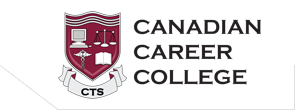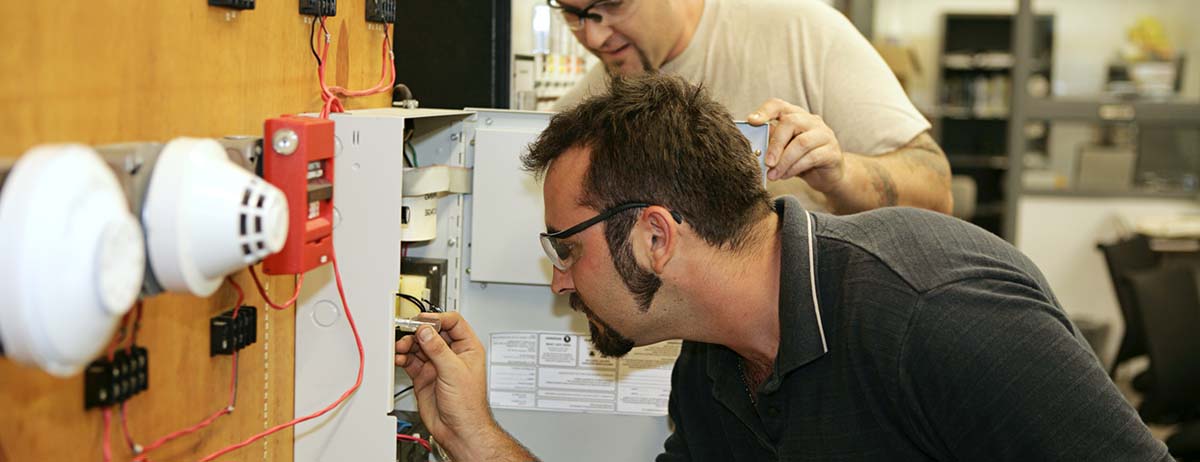Fire Technician Training
Weekly Hours: 20 weeks (incl. 160 placement hours)
learning Method: Distance Learning / Online
The program will especially appeal to those with interests in electrical systems, fire safety, or fire fighting. Upon graduation, students have completed the first step leading to the CFAA Registered Technician designation, the most-recognized credential for those who perform testing and inspection of fire alarm systems in Canada.
Graduates work in a range of security and fire protection service.
Enrolment Criteria:
Proof of high school completion (OSSD, GED, or provincial equivalent), or successful completion of a Mature Student Test.
Special Aptitudes:
Mature; detail oriented, excellent communication skills.
Program Outcomes:
Graduates receive a post-secondary certificate in the Fire Alarm Technician Apprentice Program and will qualify to complete future Fire Alarm Technician training with the Canadian Fire Alarm Association.
COURSE INCLUDE:
- Academic and Professional Success Strategies & AODA and OH&S Training
- Introduction to Computer Technology and Google Applications
- Verbal and Written Communications
- Fire Alarm Systems Overview & Fire Safety
- Basic Electricity for the Fire Alarm Technician
- Life Safety Systems Electronics (LSSE)
- Fire Alarm Systems Application
- Practical Skills Lab
- Field Placement
- CFAA Final Theory Exam
Fire Safety Technician
Course Spotlight
ACADEMIC SUCCESS STRATEGIES & AODA AND OH&S TRAINING
This course will familiarize students with the necessary academic and career skills that will contribute to their success. Tips for student success will be reviewed, and practice with student writing skills will be provided. Students will complete a module on financial literacy during this course. Research strategies will also be discussed to assist students in completing projects throughout their programs. A review of college policies will be conducted. Students will complete training modules on the Accessibility for Ontarians with Disabilities Act (AODA) and Ontario Health and Safety (OH&S) standards.
INTRODUCTION TO COMPUTER TECHNOLOGY AND GOOGLE APPLICATIONS
This course will familiarize student with the Windows operating system in anticipation of their working environments in college and beyond. Students will learn appropriate means to use computer applications, including Google applications and the Google Education set of applications.
VERBAL AND WRITTEN COMMUNICATIONS
This course will help the student develop the skills necessary to function in writing in the modern business setting. There will be a review of grammar, sentence structure, and punctuation as they apply to business communication. Formats for a variety of written business communications will be taught. Students will complete various exercises with the emphasis on improving basic skills in grammar, punctuation, and sentence structure, and apply them to writing of letters, memoranda, newsletters and reports.
FIRE ALARM SYSTEM OVERVIEW & FIRE AND SAFETY
The student will gain a general understanding of fire alarm protection systems. The purpose and specific application of the different codes and standards that regulate the industry will be introduced and discussed. Student will learn about architectural considerations regarding fire containment. Laboratory procedures, testing methods and how listed/approved materials achieve greater degrees of life safety will be explored. Lastly the student will be introduced to the nature of fire, extinguishing methods, fire alarm testing methods, interpretation of drawings, specifications and other contract documents.
BASIC ELECTRICITY FOR THE FIRE ALARM TECHNICIAN
In this course, students will be introduced to basic electric theory – Ohm’s law, Kirchoffs law, magnetism, energy generation and the dangers of higher A/C voltage. Additionally, students will learn and foster a greater understanding of the Ontario Electrical Safety Code specifically with the following areas: Conductors, raceway systems, electrical circuits and overcurrent protection, disconnecting means and all requirements pertaining to the fire alarm systems.
LIFE SAFETY SYSTEMS ELECTRONICS (LSSE)
In this course, students will learn how to read electronic schematic diagrams, understand the basic electronic theory as it applies to electron flow and current flow, impedance, inductance, and capacitance. Rectification of A/C power, the theory and operation of charging circuits, batteries, voltage regulation and testing these systems will also be explored. The student will learn to understand and identify various circuits, all types of diodes, all types of transistors, capacitors and resistors.
FIRE ALARM SYSTEM APPLICATION
In this course will explore applications of fire alarm systems and the operation, testing and inspection requirements of fire alarm systems as outlined by the various Codes and Standards. Material covered will address the basics of field wiring circuits, field devices, emergency voice communication systems and addressable fire alarm systems. Also introduced are principles and technology of fire detection devices, signal appliances, control equipment and ancillary devices. This course is taught by a CFAA certified instructor and together with the pre-requisite courses, leads to the student becoming a CFAA Fire Alarm Technician as required by the Fire Code. For CFAA Certification, a Grade of 80% or greater is required.
PRACTICAL SKILLS LAB
Students will have an opportunity to put the program theory into practice at the Practical lab skills camp, located on campus. During this course students will learn how to inspect and test both conventional and addressable fire alarm systems. In additional students will become familiar with fire alarm panel control units and what is required for safety inspections and or verifications. Lastly, students will be able to inspect and ensure the onsite control panel and the offsite monitoring system is operating to code. Students will be exposed to a simulated voice command system, control unit and/or transponder system(s), sub panels etc. The CFAA checklist will be reviewed and students will be required to simulate inspections and troubleshooting solutions.
CFAA THEORY EXAM
The purpose of the CFAA Theory Examination is to test the knowledge of each student and ensure they meet the requirements to qualify to complete practical hours towards their full certification (after graduation). The exam covers the different courses, and provides a measurement of how well the students have integrated the material. Students must score at least 80% to be successful.
FIELD PLACEMENT
Upon completion of the Fire Alarm Technician Apprentice 's in-class portion of the student program, they will be required to participate in a 160-hour placement during which time they will be evaluated on their demonstration of proficiencies by the host supervisor. To help ensure a mutually beneficial experience for both the student and the host organization, the host is asked to complete the evaluation, provide the students with experiences that will meet the objectives of the placement, and provide direction and identify the responsibilities required for the position to the student.

